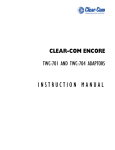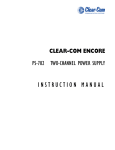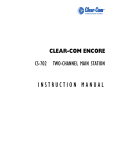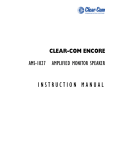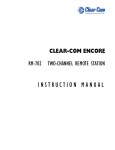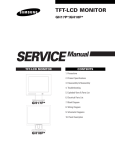Download Clear-Com Cellcom Instruction manual
Transcript
CLEAR-COM ENCORE TW-47 TWO-WAY RADIO INTERFACE INSTRUCTION MANUAL TW-47 Two-Way Radio Interface Instruction Manual © 2007 Vitec Group Communications Ltd. All rights reserved. Part Number 810502Z Rev. 2 Vitec Group Communications, LLC. 850 Marina Village Parkway Alameda, CA 94501 U.S.A Vitec Group Communications 7400 Beach Drive Cambridge Research Park Cambridgeshire United Kingdom CB25 9TP Vitec Group Communications Room 1806, Hua Bin Building No. 8 Yong An Dong Li Jian Guo Men Wai Ave Chao Yang District Beijing, P.R. China 100022 ® Clear-Com,CellCom/FreeSpeak and the Clear-Com Communication Systems logo are registered trademarks of The Vitec Group plc. CONTENTS OPERATION . . . . . . . . . . . . . . . . . . . . . . . . . . 1-1 Introduction . . . . . . . . . . . . . . . . . . . . . . . . . . . . . . . 1-1 Before you Begin . . . . . . . . . . . . . . . . . . . . . . . . . . . . 1-1 Features of the TW-47 System . . . . . . . . . . . . . . . . . . 1-1 Description of the TW-47 . . . . . . . . . . . . . . . . . . . . . 1-2 RF Interference . . . . . . . . . . . . . . . . . . . . . . . . . . . 1-3 Connecting the TW-47 to the Base Station Radio . . . 1-3 Building Your Custom Cable . . . . . . . . . . . . . . . . . . . 1-4 Option Settings . . . . . . . . . . . . . . . . . . . . . . . . . . . . . 1-7 Output Level Jumpers . . . . . . . . . . . . . . . . . . . . . . 1-8 Transmit Key Jumper . . . . . . . . . . . . . . . . . . . . . . . 1-9 Call Signal Frequency Adjust . . . . . . . . . . . . . . . . . 1-9 Check Out and Operation of the TW-47 System . . . 1-9 TW-47 Front Panel Controls and Lights . . . . . . . . . 1-11 Rear Panel of TW-47 . . . . . . . . . . . . . . . . . . . . . . . . 1-12 INSTALLATION. . . . . . . . . . . . . . . . . . . . . . . . . 2-1 Wiring Cables for Specific Radio Types . . . . . . . . . . . 2-1 For Motorola: Radius, GP300, SP-50, and Sport 7x2-1 For Yaesu: FT-411, 811, 911; FT-415, 815; FT-530; FT416, 816; FT-11R, 41R . . . . . . . . . . . . . . . . . . . . . . . 2-1 For Uniden: Model SPH; Motorola: Radius P-50 . 2-2 SPECIFICATIONS. . . . . . . . . . . . . . . . . . . . . . . . 3-1 TW-47 TWO-WAY RADIO INTERFACE i TW-47 Technical Specifications. . . . . . . . . . . . . . . . . 3-1 Radio to Party Line . . . . . . . . . . . . . . . . . . . . . . . . 3-1 Party Line to Radio . . . . . . . . . . . . . . . . . . . . . . . . 3-1 LIMITED WARRANTY . . . . . . . . . . . . . . . . . . . . . 4-I Warranty Period. . . . . . . . . . . . . . . . . . . . . . . . . . . . . .4-i Technical Support . . . . . . . . . . . . . . . . . . . . . . . . . . . 4-ii Warranty Repairs and Returns . . . . . . . . . . . . . . . . . .4-iii Non-Warranty Repairs and Returns . . . . . . . . . . . . . . 4-iv Extended Warranty . . . . . . . . . . . . . . . . . . . . . . . . . . 4-iv Liability . . . . . . . . . . . . . . . . . . . . . . . . . . . . . . . . . . . 4-v ii TW-47 TWO-WAY RADIO INTERFACE IMPORTANT SAFETY INSTRUCTIONS 1. 2. 3. 4. 5. 6. 7. 8. 9. 10. 11. 12. 13. Read these instructions. Keep these instructions. Heed all warnings. Follow all instructions. Do not use this apparatus near water. Clean only with dry cloth. Do not block any ventilation openings. Install in accordance with the manufacturer’s instructions. Do not install near any heat sources such as radiators, heat registers, stoves, or other apparatus (including amplifiers) that produce heat. Only use attachments/accessories specified by the manufacturer. Use only with the cart, stand, tripod, bracket, or table specified by the manufacturer, or sold with the apparatus. When a cart is used, use caution when moving the cart/apparatus combination to avoid injury from tip-over. Unplug this apparatus during lightning storms or when unused for long periods of time. Refer all servicing to qualified service personnel. Servicing is required when the apparatus has been damaged in any way, such as power-supply cord or plug is damaged, liquid has been spilled or objects have fallen into the apparatus, the apparatus has been exposed to rain or moisture, does not operate normally, or has been dropped. WARNING: To reduce the risk of fire or electric shock, do not expose this product to rain or moisture. TW-47 TWO-WAY RADIO INTERFACE i Please familiarize yourself with the safety symbols in Figure 1. When you see these symbols on this product, they warn you of the potential danger of electric shock if the station is used improperly. They also refer you to important operating and maintenance instructions in the manual. CAUTION RISK OF ELECTRIC SHOCK DO NOT OPEN This symbol alerts you to the presence of uninsulated dangerous voltage within the product's enclosure that might be of sufficient magnitude to constitute a risk of electric shock. Do not open the product's case. This symbol informs you that important operating and maintenance instructions are included in the literature accompanying this product. Figure 1: Safety Symbols ii TW-47 TWO-WAY RADIO INTERFACE EMC AND SAFETY The TW-47 Two-Way Radio Interface meets all relevant CE and FCC specifications set out below: EN55103-1 Electromagnetic compatibility. Product family standard for audio, video, audio-visual, and entertainment lighting control apparatus for professional use. Part 1: Emissions. EN55103-2 Electromagnetic compatibility. Product family standard for audio, video, audio-visual, and entertainment lighting control apparatus for professional use. Part 2: Immunity. And thereby compliance with the requirement of Electromagnetic Compatibility Directive 2004/108/EC and Low Voltage Directive 2006/95/EC This device complies with Part 15 of the FCC Rules. Operation is subject to the following two conditions: (1) this device may not cause harmful interference, and (2) this device must accept any interference received, including interference that may cause undesired operation. TW-47 TWO-WAY RADIO INTERFACE iii iv TW-47 TWO-WAY RADIO INTERFACE 1 OPERATION INTRODUCTION Congratulations on choosing this Clear-Com product. Clear-Com was established in 1968 and remains the market leader in providing intercoms for entertainment, educational, broadcast and industrial applications. The ruggedness and high build-quality of Clear-Com products defines the industry standard. In fact, many of our original beltpacks and main stations are still in daily use around the world. BEFORE YOU BEGIN To get the most out of your Clear-Com equipment, read this manual carefully. It will answer many questions you may have about operating and servicing your equipment. You may also call Clear-Com’s customer service department at (510) 337-6600 for answers to any questions that are not covered in this manual. FEATURES OF THE TW-47 SYSTEM • Any walkie-talkie with an external microphone input and earphone output can be connected to the TW-47. • Clear-Com or TW Channel A or B intercom line operation. • Powered from the intercom system. • Base station radio keyed from intercom call signal. • Visual transmitter keying indicator. • Audio level indicator. TW-47 TWO-WAY RADIO INTERFACE 1-1 • Separate transmit and receive level control adjustment. DESCRIPTION OF THE TW-47 The TW-47 two-way radio interface is a one-channel unit that is used to connect a two-way radio (commonly known as a walkietalkie) to any channel in a party-line intercom system. When used with remote radios, the radio connected to the TW-47 acts as if it were the base station for a wireless remote system. The illustration in Figure 1-1 shows a typical intercom setup. Figure 1-1: Typical Intercom Setup Connecting the TW-47 to the Intercom System The TW-47 is connected to the intercom system by a 2conductor, shielded cable plugged into its female XLR jack, labeled “intercom.” The pin-out connectors on the XLR are configured as follows: Pin 1 - Shield Pin 2 - Power/TW Channel A Pin 3 - Intercom audio/TW Channel B This is the standard wiring for a Clear-Com intercom system. With a different setting of the internal switches, the TW-47 will also accommodate RTS® and compatible systems. 1-2 TW-47 TWO-WAY RADIO INTERFACE The TW-47 should be connected to the intercom station nearest to the person who will be operating the base-station radio. If the unit is being connected directly to the main intercom station, it should, if possible, be connected directly to a separate main station output. RF INTERFERENCE To avoid RFI interference, make sure the base-station radio and the TW-47 interface is well removed from the intercom station to which it is connected (2 to 5 feet / .6 to 1.52 m). Make sure the cable connecting the TW-47 to the main station is kept separate from the other intercom cables. CONNECTING THE TW-47 TO THE BASE STATION RADIO In order to accommodate the widest variety of 2-way radios, the TW-47 is supplied with a 9-pin connector and wiring diagrams for many two-way radios. (See “Wiring Cables for Specific Radio Types” later in this manual.) This will allow you to make your own custom-made cable for your particular radio. This connector socket is labeled on the TW-47 back panel as TWO-WAY RADIO. The combination of internal jumpers, connector wiring and front panel “Transmit” and “Receive” level controls assures correct level matching to virtually any radio. A relay provides the required “push-to-talk” transmitter “keying” of the radio. This relay is activated when the “call signal” on the Clear-Com intercom channel is detected. The relay contacts, in conjunction with the custom-made cable, allow for correct transmitter keying to virtually any type of radio. The illustration in Figure 1-2 is a simplified schematic showing the DB-9 connections. TW-47 TWO-WAY RADIO INTERFACE 1-3 Figure 1-2: Connecting the TW-47 to a Base Station Radio BUILDING YOUR CUSTOM CABLE To connect the base-station radio to the TW-47, you must build your own custom connector cable. This involves several steps. 1. Obtain or make a cable using mini or micro plugs that fit your radio. Use single conductor shielded wire for each cable. Miniature type stereo cable is a good choice. Solder these cables to the DB9 connector as shown in example 1. This cable length should be kept under 5 feet (1.52 m). A good source of molded connectors for your radio would be an external microphone or earphone which can be purchased from your radio supplier. You need to cut off the microphone or earphone as it will not be needed. 2. The next step will be to set the type and level of microphone. The TW-47 has three internal jumpers that can be set for specific types of microphones. The three illustrations that follow show how the TW-47 jumpers and male DB-9 on the channel cable are configured for most radios. The section that follows, “Option Settings,” gives instructions for setting the TW-47’s internal jumpers. 1-4 TW-47 TWO-WAY RADIO INTERFACE 3. The most difficult setting is getting your particular radio to key properly. Every radio has a different method of externally keying its transmitter. To determine how to set the jumpers and wire the connector, you need to know what type of external microphone is used in your radio, or you need to experiment. Below are three examples of how to key the transmitter. If you are unsure of which wiring to use, try all three one at a time. Pins 2, 3, 4 and 7 are the relay contacts in the TW-47. If your radio model is not listed in “Wiring Cables for Specific Radio Types” and you have tried all three examples, and you still can’t make the base station walkie-talkie work properly, call customer service and we will help you get the system working. Example 1: Relay shunting the microphone Shield 1 6 2 Tip From walkie-talkie earphone 7 3 8 4 9 Tip 5 To walkie-talkie microphone input Shield Jumper settings J6 Off J7 Off J8 On (Medium gain mic input) Figure 1-3: Relay shunting the microphone TW-47 TWO-WAY RADIO INTERFACE 1-5 Example 2: Relay in series with the microphone Shield 1 6 2 Tip From walkie-talkie earphone 7 3 8 4 9 Tip 5 To walkie-talkie microphone input Shield Jumper settings J6 On (DC path for mic) J7 Off J8 On (Medium gain mic input) Figure 1-4: Relay in series with the microphone Example 1: Relay across the sleeves of the microphone and earphone connectors Shield 1 6 2 Tip From walkie-talkie earphone 7 3 8 4 9 Tip 5 To walkie-talkie microphone input Shield Jumper settings J6 On (DC path for mic) J7 Off J8 On (Medium gain mic input) Figure 1-5: Relay across the sleeves of the mic and earphone connectors 1-6 TW-47 TWO-WAY RADIO INTERFACE OPTION SETTINGS Internal switches select the intercom line interface of the TW-47. To access the switches, remove the four screws retaining the top cover and remove it. The switches are located on the PCB on the right hand side of the unit. The switch handles are easily accessible. The settings are as follows: • When the Intercom Compatibility Switch is set to Clear-Com (C-C), intercom audio is on pin 3 of the XLR connector. The DC level call signal is sensed on this pin. In this position, the TW intercom channel switch setting has no effect. • When the Intercom Compatibility Switch is set to TW, the intercom audio XLR pin connection is determined by the TW intercom channel switch. The call signal is sensed as a 20 KHz signal on the selected intercom audio pin. • When the TW Intercom Channel Switch is set to pin 2, intercom audio is on pin 2 (channel A) of the XLR connector, and when the TW intercom channel switch is set to pin 3, intercom audio is on pin 3 (channel B) of the XLR connector. The Figure 1-6 on page 1-8 shows the location of the jumpers and switches on the printed circuit board. TW-47 TWO-WAY RADIO INTERFACE 1-7 20 KHz Call Signal Adjustment Jumper J8 Jumper J7 Jumper J6 Intercom TW Intercom Compatibility Switch (S1) Channel Switch (S2) TP1 Figure 1-6: Location of Switches and Jumpers on Printed Circuit Board A jumper is set to ON when the left hand two pins are joined (the default position for J6). A jumper is set to OFF when the right hand two pins are joined (the default position for J7 and J8). OUTPUT LEVEL JUMPERS Set jumpers J7 or J8 to ON to lower the signal level to the walkietalkie’s microphone output. The jumpers change the levels, as follows: Jumper J7 & J8 OFF: +11 dbu to –20 dbu Jumper J8 ON: –26 dbu Jumper J7 and J8 ON: –30 dbu to –57 dbu In general, set jumper J8 to ON for most low-level mics (for example, electrets). Set both jumpers J7 and J8 to ON to further reduce the input level of dynamic-type mics. 1-8 TW-47 TWO-WAY RADIO INTERFACE TRANSMIT KEY JUMPER For some walkie-talkies or two-way radios, a dedicated power path may be needed to activate their transmit function. If so, set jumper J6 to ON. CALL SIGNAL FREQUENCY ADJUST The 20 KHz call signal detector is calibrated at the factory and should not require further adjustment. If it becomes necessary to correct the frequency adjustment for any reason, this can be done by adjusting the internal potentiometer. Refer to Figure 1-6 for location of the potentiometer. The adjustment is performed by measuring the frequency at TP1 and adjusting the pot until the frequency is 20 KHz. If the adjustment must be performed without instruments, connect the TW-47 to a TW intercom and repeatedly assert a call signal. Adjust the pot until the red transmit on light on the front panel accurately tracks the call signal. CHECK OUT AND OPERATION OF THE TW-47 SYSTEM After you have made the appropriate custom cable and connected the TW-47 to the wired main and wireless base stations, it is now time to check that everything is working properly. 1. Turn on the base station radio and the remote radio. Make sure you have fresh or fully charged batteries. With the external jacks on the base station removed, make sure the radios are communicating with each other. 2. Set the base station volume control to approximately half volume. Have one person listen on the intercom and have another person talk on the remote walkie-talkie. You should now be able to communicate from the remote station walkie-talkie through the base station TW-47 TWO-WAY RADIO INTERFACE 1-9 into the intercom system. Observe the audio level indicators on the TW-47. While speaking on the remote walkie-talkie the green LED should be flashing with some occasional flashes of the red LED. If this is not the case adjust the volume control on the base walkie-talkie to get the desired indication. 3. CHECKING OUT THE BASE STATION TRANSMITTER: From the main station or remote station, turn on the talk button for the channel that the TW-47 is connected to. Press and hold the call button while speaking. Note the transmit on light on the TW-47 should illuminate and the transmit indicator on the base station radio (if any) should also illuminate. At this point you should be communicating from the intercom system to the remote station walkie-talkie. The transmit level control on the front panel of the TW-47 adjusts the volume to the remote station walkie-talkie. Adjust this level if necessary. Release the call button. 4. Remember that communication to the remote walkietalkie is “push-to-talk.” You must release the call button to receive communications from the remote walkietalkies. 5. Certain Clear-Com stations can be set up so that the call signalling can be activated automatically when the “talk” button is pressed (“call-on-talk”). If this feature is available on your model of intercom station, set it, but make sure that the latching feature of the “talk” button is disabled (“latch disable.”) 1-10 TW-47 TWO-WAY RADIO INTERFACE TW-47 FRONT PANEL CONTROLS AND LIGHTS 3 4 2 1 Level Adjust Receive Transmit On Audio Level Over Norm Transmit TW-47 2-Way Radio Interface Figure 1-7: Front View of TW-47 1. RECEIVE LEVEL ADJUST. Use to adjust the receive level of the base station two-way radio when there is no external volume control on the base station radio. CAUTION: The receive level is set at the factory and should be adjusted only if the remote radio does not have its own volume adjustment. The default is 12 o’clock (1/2 rotation). 2. TRANSMIT LEVEL ADJUST. Use transmit level adjust to set the level of the intercom’s audio as heard at the remote station walkie-talkie. 3. TRANSMIT ON LIGHT. The light illuminates when a call signal is being sent from the intercom system. 4. AUDIO LEVEL LIGHTS. Red and green lights indicate the audio level in the intercom system. Use these indicators to adjust the volume control on the base station walkie-talkie to match the wired intercom levels. The red light illuminates when the signal is too high. Note that proper intercom levels cause the red light to illuminate about 10 percent of the time. TW-47 TWO-WAY RADIO INTERFACE 1-11 REAR PANEL OF TW-47 5 6 Intercom Two-Way Radio Figure 1-8: Rear View of TW-47 5. INTERCOM LINE CONNECTOR. Use the three-pin female XLR connector on the TW-47’s back panel to connect the unit to the intercom channel. As with other Clear-Com remote stations, power is provided through the cable. 6. TWO-WAY RADIO CONNECTOR. Use the DB-9F connector to connect the TW-47 to the base-station radio. 1-12 TW-47 TWO-WAY RADIO INTERFACE 2 INSTALLATION WIRING CABLES FOR SPECIFIC RADIO TYPES Use the following information to wire cables and set jumpers for specific radios. FOR MOTOROLA: RADIUS, GP300, SP-50, AND SPORT 7X Set jumpers to the following positions: J6, off; J7, on; J8, on. Use the example in Figure 2-1 on page 2-1. To get a molded connector, order Motorola Part#HMN 9787DR headset with swivel boom mic with clamp. 1 6 Red Shield Black Tip Earphone 2 7 3 Microphone 8 4 9 5 White Tip Shield (Molded Connector Shown) Note: Set J7 and J8 according to transmit gain requirements Figure 2-1: Motorola Radios FOR YAESU: FT-411, 811, 911; FT-415, 815; FT530; FT-416, 816; FT-11R, 41R TW-47 TWO-WAY RADIO INTERFACE 2-1 Set jumpers to the following positions: J6, on; J7. off; J8, on. To get a molded connector, order YAESU Part# MH-32 A2B speaker microphone. Shield 1 6 Earphone Tip 2 7 3 8 4 Microphone 9 5 Tip Shield Note: Set J7 and J8 according to transmit gain requirements. Figure 2-2: Yaesu Radios FOR UNIDEN: MODEL SPH; MOTOROLA: RADIUS P50 Set jumpers to the following positions: J6, on; J7, on; J8, on. Shield 1 6 Tip Earphone 2 7 3 8 4 9 5 Tip Microphone Shield Note: Set J7 and J8 according to transmit gain requirements. Figure 2-3: Uniden & Motorola Radios 2-2 TW-47 TWO-WAY RADIO INTERFACE 3 SPECIFICATIONS TW-47 TECHNICAL SPECIFICATIONS dBu is an absolute measurement. 0 dBu is referenced to 0.775 volts RMS RADIO TO PARTY LINE LINE CHARACTERISTICS Frequency Response Max Gain Distortion Noise Max Level Before Clipping Green LED Threshold Red LED Threshold Input Impedance: 200-20KHz ± 3dB >=-5dBu <=0.3% <=-70dBu >=+17dBu -22dBu ± 3dB -16dBu ± 3dB 400Ω ± 100Ω PARTY LINE TO RADIO LINE CHARACTERISTICS Frequency Response Max Gain J7 ON, J8 ON Max Gain J7 OFF, J8 ON Max Gain J7 OFF, J8 OFF Distortion Noise Max Level Before Clipping TW-47 TWO-WAY RADIO INTERFACE 200-8KHz ± 3dB -12dBu ± 3dB +2dBu ± 3dB +27dBu ± 3dB <=0.3% <=-50dBu >=0dBu 3-1 Power Requirements Input Voltage Range Quiescent Current Current with Audio Current with Call 20-30VDC <=40mA <=50mA <=60mA Rear Panel Connectors Rear panel: (1) XLR3F (1) DB-9F Front Panel Controls and Indicators Transmit Audio Level Hi Audio Level Norm Receive Level Adjust Transmit Level Adjust Dimensions (1) Red LED (1) Red LED (1) Green LED (1) Control (1) Control 1.8"H x 3.95"W x 6.4"D (46 mm x 100 mm x 163 mm) Weight 1 lb. 4 oz. (0.6 kg) Notice About Specifications While Clear-Com makes every attempt to maintain the accuracy of the information contained in its product manuals, that information is subject to change without notice. Performance specifications included in this manual are design-center specifications and are included for customer guidance and to facilitate system installation. Actual operating performance may vary. 3-2 TW-47 TWO-WAY RADIO INTERFACE LIMITED WARRANTY Vitec Group Communications (VGC) warrants that at the time of purchase, the equipment supplied complies with any specification in the order confirmation when used under normal conditions, and is free from defects in workmanship and materials during the warranty period. During the warranty period VGC, or any service company authorized by VGC, will in a commercially reasonable time remedy defects in materials, design, and workmanship free of charge by repairing, or should VGC in its discretion deem it necessary, replacing the product in accordance with this limited warranty. In no event will VGC be responsible for incidental, consequential, or special loss or damage, however caused. Return Material Authorization (RMA) numbers are required for all returns. Both warranty and non-warranty repairs are available. WARRANTY PERIOD The product may consist of several parts, each covered by a different warranty period. The warranty periods are: • Cables, accessories, components, and consumable items have a limited warranty of 90 days. • Headsets, handsets, microphones, and spare parts have a limited warranty of one year. • UHF wireless IFB products have a limited warranty of one year. WARRANTY i • UHF wireless intercom systems have a limited warranty of three years. • All other Clear-Com and Drake brand systems and products, including beltpacks, have a limited warranty of two years. The warranty starts at the time of the product’s original purchase. The warranty start date for contracts which include installation and commissioning will commence from the earlier of date of the Site Acceptance Test or three months from purchase. TECHNICAL SUPPORT To ensure complete and timely support to its customers, VGC’s User Support Center is staffed by qualified technical personnel. Telephone and email technical support is offered worldwide by the User Support Center. The User Support Center is available to VGC’s customers during the full course of their warranty period. Instructions for reaching VGC’s User Support Centers are given below. Telephone for Europe, Middle East and Africa: +49 40 6688 4040 or +44 1223 815000 Telephone for the Americas and Asia: +1 510 337 6600 Email: [email protected] Once the standard warranty period has expired, the User Support Center will continue to provide telephone support if you have purchased an Extended Warranty. For latest contact information please refer to the Service and Support section at www.clearcom.com. ii WARRANTY WARRANTY REPAIRS AND RETURNS Before returning equipment for repair, contact a User Support Center to obtain a Return Material Authorization (RMA). VGC representatives will give you instructions and addresses for returning your equipment. You must ship the equipment at your expense, and the support center will return the equipment at VGC’s expense. For out-of-box failures, use the following contact information: Europe, Middle East and Africa Tel: +44 1223 815000 Email: [email protected] North America, Canada, Mexico, Caribbean & US Military Tel: +1 510 337 6600 Email: [email protected] Asia Pacific & South America Tel: +1 510 337 6600 Email: [email protected] VGC has the right to inspect the equipment and/or installation or relevant packaging. For latest contact information please refer to the Service and Support section at www.clearcom.com. WARRANTY iii NON-WARRANTY REPAIRS AND RETURNS For items not under warranty, you must obtain an RMA by contacting the User Support Center. VGC representatives will give you instructions and addresses for returning your equipment. You must pay all charges to have the equipment shipped to the support center and returned to you, in addition to the costs of the repair. EXTENDED WARRANTY You can purchase an extended warranty at the time of purchase or at any time during the first two years of ownership of the product. The purchase of an extended warranty extends to five years the warranty of any product offered with a standard two-year warranty. The total warranty period will not extend beyond five years. Note: VGC does not offer warranty extensions on UHF wireless intercom systems, or on any product with a 1-year or 90-day warranty. iv WARRANTY LIABILITY THE FOREGOING WARRANTY IS VGC'S SOLE AND EXCLUSIVE WARRANTY. THE IMPLIED WARRANTY OF MERCHANTABILITY AND FITNESS FOR A PARTICULAR PURPOSE AND ANY OTHER REQUIRED IMPLIED WARRANTY SHALL EXPIRE AT THE END OF THE WARRANTY PERIOD. THERE ARE NO OTHER WARRANTIES (INCLUDING WITHOUT LIMITATION WARRANTIES FOR CONSUMABLES AND OTHER SUPPLIES) OF ANY NATURE WHATSOEVER, WHETHER ARISING IN CONTRACT, TORT, NEGLIGENCE OF ANY DEGREE, STRICT LIABILITY OR OTHERWISE, WITH RESPECT TO THE PRODUCTS OR ANY PART THEREOF DELIVERED HEREUNDER, OR FOR ANY DAMAGES AND/OR LOSSES (INCLUDING LOSS OF USE, REVENUE, AND/OR PROFITS). SOME STATES DO NOT ALLOW THE EXCLUSION OR LIMITATION OF INCIDENTAL OR CONSEQUENTIAL DAMAGES OR THE LIMITATION ON HOW LONG AN IMPLIED WARRANTY LASTS, SO THE ABOVE LIMITATIONS MAY NOT APPLY TO YOU. IN ANY EVENT, TO THE MAXIMUM EXTENT PERMITTED UNDER APPLICABLE LAW, VGC'S LIABILITY TO CUSTOMER HEREUNDER SHALL NOT UNDER ANY CIRCUMSTANCES EXCEED THE COST OF REPAIRING OR REPLACING ANY PART(S) FOUND TO BE DEFECTIVE WITHIN THE WARRANTY PERIOD AS AFORESAID. WARRANTY v This warranty does not cover any damage to a product resulting from cause other than part defect and malfunction. The VGC warranty does not cover any defect, malfunction, or failure caused beyond the control of VGC, including unreasonable or negligent operation, abuse, accident, failure to follow instructions in the manual, defective or improperly associated equipment, attempts at modification and repair not approved by VGC, and shipping damage. Products with their serial numbers removed or defaced are not covered by this warranty. This warranty does not include defects arising from installation (when not performed by VGC), lightning, power outages and fluctuations, air conditioning failure, improper integration with non-approved components, defects or failures of customer furnished components resulting in damage to VGC provided product. This limited warranty is not transferable and cannot be enforced by anyone other than the original consumer purchaser. This warranty gives you specific legal rights and you may have other rights which vary from country to country. vi WARRANTY






























